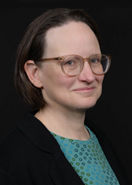Cancer
Cancer is complex and can be a devastating diagnosis for individuals and their families. Our researchers work to improve cancer-related care on many levels, from prevention and screening through treatment and survivorship.
In 1986, Kaiser Permanente Washington Health Research Institute (KPWHRI) launched a then-novel initiative to develop and implement an evidence-based breast cancer screening program with collaborators across the U.S., using a computer-based registry. The program ultimately led to a rich portfolio of studies on breast, colorectal, blood, cervical, lung, and ovarian cancer, among other types.
Decades later, Kaiser Permanente Washington is just as committed to developing and evaluating innovations in cancer care.
The core of KPWHRI cancer research lies in its participation in collaborative networks and programs. These partnerships increase the power of Kaiser Permanente Washington studies and help us learn from different populations and health care settings. Examples of these networks include:
Breast Cancer Surveillance Consortium (BCSC)
The BCSC identifies strategies that detect aggressive breast cancer early, minimize harms, and reach diverse communities. Results help policymakers and health systems improve breast cancer screening and surveillance outcomes. The Kaiser Permanente Washington Breast Imaging Registry contributes to this national effort, and the BCSC Statistical Coordinating Center resides at KPWHRI.
Population-based Research to Optimize the Screening Process (PROSPR)
The PROSPR national consortium conducts research to improve screening for cervical, colorectal, and lung cancers. PROSPR results help optimize and tailor screening for different subgroups of the population.
Research highlights
 Making cancer screening easier
Making cancer screening easier
KPWHRI research has helped make screening for cervical and colorectal cancer easier and more accessible. Our scientists led groundbreaking studies that found people were more likely to complete screening if they received mailed test kits — either a human papillomavirus (HPV) test for cervical cancer screening or a fecal immunochemical test (FIT) for colorectal cancer screening. Kaiser Permanente Washington now provides mailed kits as a screening option for both cancers.
 Analysis supports starting mammograms at 40
Analysis supports starting mammograms at 40
KPWHRI researchers were part of a multi-site study that found breast cancer screening beginning at age 40 has the potential to reduce death rates from the disease while minimizing screening harms, such as false-positive results. These findings informed the updated breast cancer screening recommendations from the U.S. Preventive Services Task Force.
 Addressing young cancer survivors' care needs
Addressing young cancer survivors' care needs
Adolescents and young adults with cancer have unique needs throughout treatment and afterward. KPWHRI researchers created a patient-centered care model for this population through interviews with young cancer survivors. The model provides a framework for targeting care gaps and visualizing changes, with 8 focus areas: coordinated care, mental health, quality of life, peer support, side effects or late effects resulting from the cancer or treatment, fertility, financial support, and attentiveness to the unique needs of young adults.
 Breast density is a risk factor for older women, too
Breast density is a risk factor for older women, too
Having dense breasts is a known risk factor for breast cancer among women ages 40 to 65, but few studies have explored breast density as a possible risk factor for older women. To fill this gap, KPWHRI researchers and collaborators looked at data on 221,714 screening mammograms from women ages 65 and older compiled by the BCSC. They found that breast density was linked to higher breast cancer risk for this age group, helping to inform screening decisions for older women and their doctors.
Researchers in Cancer
 Melissa L. Anderson, MSPrincipal Collaborative Biostatistician |
 Erin J. Bowles, MPHDirector, Collaborative Science |
 Jessica Chubak, PhDSenior Investigator |
 Yates Coley, PhDAssociate Biostatistics Investigator |
 Andrea J. Cook, PhDSenior Biostatistics Investigator |
 Marlaine Figueroa Gray, PhDAssistant Investigator |
 Beverly B. Green, MD, MPHSenior Investigator |
 Laura E. Ichikawa, MSPrincipal Collaborative Biostatistician |
 Lorella Palazzo, PhDSenior Collaborative Scientist |
 Gaia Pocobelli, PhDSenior Collaborative Scientist |
 Rod L. Walker, MSPrincipal Collaborative Biostatistician |
 Robert D. Wellman, MSPrincipal Collaborative Biostatistician |
 Karen Wernli, PhDSenior Investigator |
 Onchee Yu, MSPrincipal Collaborative Biostatistician |
 Weiwei Zhu, MSSenior Collaborative Biostatistician |
 Yu-Ru Su, PhDAssociate Biostatistics Investigator |
 Brian D. Williamson, PhDAssistant Biostatistics Investigator |
 Noorie Hyun, PhDAssociate Biostatistics Investigator |
 Pamela A. Shaw, PhD, MSSenior Biostatistics Investigator |
 Nicole M. Gatto, PhD, MPHPrincipal Collaborative Scientist |
 Meagan C. Brown, PhD, MPHAssistant Investigator |
 Nora Henrikson, PhD, MPHAssociate Investigator |
AFFILIATE RESEARCHERS
Wylie Burke, MD, PhD
University of Washington (UW) Department of Medical History and Ethics
Joann G. Elmore, MD, MPH
Harborview Medical Center; UW Department of Epidemiology
Larry Kessler, ScD
UW Department of Health Services
Constance D. Lehman, MD, PhD
Seattle Cancer Care Alliance; UW Department of Radiology
Kathy Leppig, MD
Kaiser Foundation Health Plan of Washington; UW Department of Pathology
Peggy L. Porter, MD
Fred Hutchinson Cancer Research Center (FHCRC); UW Department of Pathology
Emily White, PhD
FHCRC; UW Department of Epidemiology
Rachel Winer, PhD, MPH
Fred Hutchinson/UW Cancer Consortium; UW Department of Epidemiology



